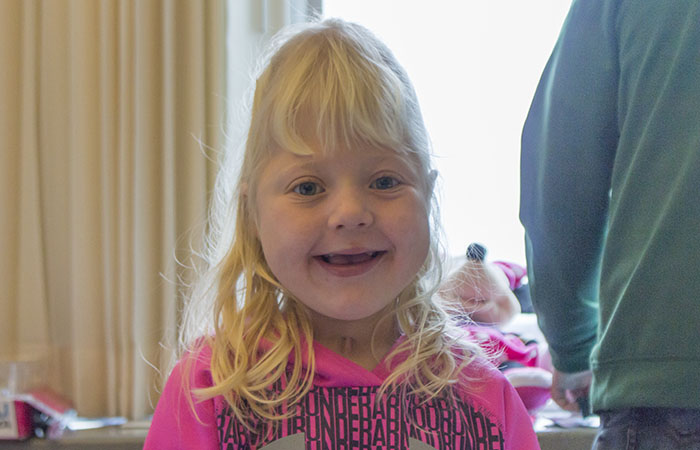Hailee's Story
Every parent has dreams for their child and is hopeful they can bring something forth to this world to make it a better place. When Shannon Kin gave birth to her daughter Hailee in 2008, she didn’t realize just how much of an impact her little girl would make.
“My pregnancy was normal, but my delivery wasn’t,” recalls Shannon. “Hailee was stuck and once they got her out she was kind of misshapen. Eventually, she took shape and her numbers were good, so we got to go home.”
Hailee was your typical baby for the first month or so, but when she started not to eat and began to vomit frequently, Shannon knew something wasn’t right.
“At her 2-month checkup the doctor said she wasn’t thriving and her muscle tone didn’t seem right, so tests and ultrasounds were performed,” said Shannon. “The doctors weren’t able to find anything so they referred her to a specialist. It was then we learned she has severe infantile hypophosphastia.”
Infantile hypophosphastia is a disease that affects the development of bones and teeth. Shannon and her husband Brian learned that at that time, there was no treatment for this rare condition.
“We learned that 50-percent of kids who have this disease, die before they’re 1,” recalls Shannon. “My first thought was, ‘how am I going to pay for her funeral?’ They sent us home and I just kept researching online until I found information about a trial for a drug that had not yet been approved in the United States. I contacted them and they asked if we’d be willing to do this trial.”
Finding hope in the unknown
The Kins, of Greenland, Michigan, knew they had to do something, and fast. At 5 months old, Hailee was only 8 lbs. They were willing to enroll Hailee in the drug trial, but a hospital sponsor would be needed to accommodate her for several months while she trialed the drug.
“They contacted me and said we have a hospital in Green Bay that has all the resources available and they are willing to take her on,” said Shannon.
Less than a month later, on Nov. 25, 2008, Hailee was admitted to HSHS St. Vincent Hospital to begin treatment and become the second person in the world to be enrolled in this particular drug trial. A team of doctors and nurses were dedicated to Hailee’s care, including Prevea Pediatric Intensivist, Dr. John Taylor.
“Part of the study was to look at the bones and the bone structure,” said Dr. Taylor. “Initially, the bones looked very abnormal. However, within two months we were starting to see significant changes throughout the X-rays, suggesting that there was improvement in calcification and the presence of new, solid bone.”
Hailee continued the trial and treatment at HSHS St. Vincent Hospital for seven and a half years, showing improvement after each hospital visit.
“From the minute we got here, they made us feel so welcome,” said Shannon. “There are no words to thank them for everything. I can see the love they have for her. They always made us feel not like a patient, but like family.”
While Hailee still has some challenges ahead, she has made significant strides in her health. She has also made a tremendous impact on others who have been diagnosed with hypophosphatasia, or could be in the future. “Watching her grow has been a remarkable experience,” said Dr. Taylor. “She has an amazing, endearing personality that really grabs at your heart.”
Thanks to Hailee’s – and others’- successful outcomes with the trial drug asfotase alfa, the U.S. Food and Drug Administration approved it for treatment of patients with perinatal-infantile-and juvenile-onset hypophosphatasia on Oct. 23, 2015.
